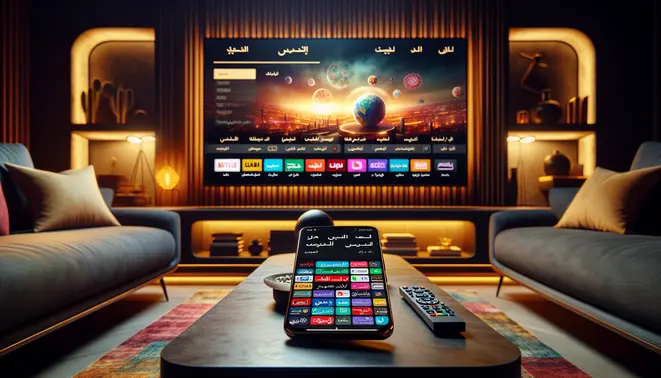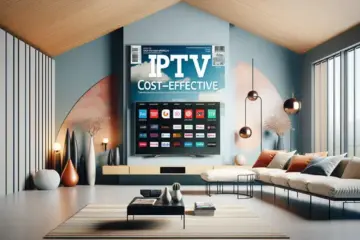Arabic IPTV The Complete Commercial Investigation Guide

Table of Contents
- The Driving Forces Behind the Arabic IPTV Boom
- Who is the Modern Arabic IPTV User?
- Why Cable Television is Losing Its Grip
- The Legal Landscape of Arabic IPTV Services
- Top Arabic IPTV Providers Compared
- Essential Hardware and Device Compatibility
- Assessing Arabic IPTV Content Quality
- Understanding Arabic IPTV Subscription Costs
- Future Trends in the Arabic IPTV Market
The Driving Forces Behind the Arabic IPTV Boom
The Arabic IPTV market is experiencing explosive growth, transforming how millions access entertainment. This surge is fueled by a combination of technological advancement and shifting consumer demands, creating a dynamic landscape where streaming services are decisively outpacing traditional cable. [Source: Business Wire]
Several key trends are propelling the Arabic IPTV market forward. Firstly, the region has seen a massive increase in internet penetration and the proliferation of affordable smart devices. Consequently, accessing a world of content is now easier than ever. Secondly, there is a growing appetite for on-demand and personalized content, a need that traditional broadcast schedules simply cannot fulfill. Our complete IPTV subscription guide details how these services offer unparalleled flexibility.
Moreover, providers are aggressively catering to local preferences. This includes offering extensive libraries of Arabic dramas, movies, and live sports from regional leagues, which are often unavailable on international platforms. This hyper-localization is a critical competitive edge.
Who is the Modern Arabic IPTV User?
The user demographic for Arabic IPTV is broad but has distinct characteristics. A significant portion consists of younger, tech-savvy millennials and Gen Z viewers who have grown up with digital content. However, the appeal also extends to families and expatriate communities seeking to stay connected to their home culture through news and entertainment. For these users, the value proposition of accessing both international and hyper-local content in one place is irresistible. Many start their journey by exploring options through a comprehensive IPTV free trial to test services before committing.
Why Cable Television is Losing Its Grip
The decline of traditional cable in the region is directly linked to the advantages offered by IPTV. Cable packages are often inflexible, forcing customers to pay for large bundles of channels they do not watch. In contrast, IPTV services typically provide more customizable and cost-effective plans. Furthermore, the superior viewing experience—featuring high-definition streams, video-on-demand (VOD) libraries, and catch-up TV—makes cable feel outdated.
Finally, the convenience of watching content on any device, anywhere, is a game-changer. Whether on a smartphone during a commute or on a smart TV at home, IPTV provides a seamless experience that cable cannot match. This shift signals a permanent change in media consumption habits across the Arab world.
The Legal Landscape of Arabic IPTV Services
The Arabic IPTV market has experienced explosive growth, with services offering access to premium channels from across the Middle East and North Africa. However, this rapid expansion has created a complex legal environment where legitimate providers operate alongside illegal streaming services. Understanding the distinction is crucial for both consumers and businesses operating in this space.
Legitimate Arabic IPTV services obtain proper licensing agreements with content creators and broadcasters. These providers pay substantial fees for distribution rights, ensuring that content owners receive fair compensation. In contrast, illegal services operate without authorization, redistributing copyrighted material through unauthorized streams. This practice directly violates international copyright laws and deprives content creators of revenue.
Copyright Violations and Industry Impact
Copyright infringement represents the primary legal issue surrounding unauthorized IPTV services. These operations typically offer thousands of channels at suspiciously low prices, a clear indicator that proper licensing hasn’t occurred. The global television and film industry loses billions annually to piracy, with Arabic content being particularly vulnerable due to high demand and limited legal availability in some regions.
Major sports organizations like beIN Sports and entertainment conglomerates such as MBC Group have launched aggressive anti-piracy campaigns targeting illegal IPTV providers. These companies employ sophisticated tracking technologies to identify and shut down unauthorized streams. When you choose an IPTV subscription, verifying its legitimacy protects you from supporting these illegal operations.
Identifying Red Flags in Arabic IPTV Services
Several warning signs can help identify potentially illegal Arabic IPTV services. First, pricing that seems too good to be true often indicates piracy. Legitimate services have substantial licensing costs that must be reflected in their subscription fees. Second, providers offering extensive channel lineups from multiple countries and regions at minimal cost are likely operating illegally.
Other red flags include:
- Lack of transparent company information or physical address
- Payment methods limited to cryptocurrency or other untraceable options
- Absence of proper customer support or service agreements
- Promotion primarily through social media or private messaging apps
- Inconsistent service quality with frequent channel downtime
Additionally, many illegal providers offer IPTV free trials as bait, knowing that once users experience the convenience, they’re more likely to subscribe despite legal concerns.
Legal Consequences for Users and Providers
While consumers often believe they face minimal risk when using illegal streaming services, the legal landscape is changing rapidly. Many countries have strengthened enforcement against IPTV piracy, with consequences ranging from warning letters and service termination to substantial fines and even criminal charges in severe cases.
Internet service providers increasingly monitor for illegal streaming activity and may issue warnings or restrict bandwidth to repeat offenders. In several high-profile cases, users of illegal IPTV services have faced civil lawsuits from content owners seeking damages for copyright infringement. Meanwhile, operators of these services face severe penalties, including multi-million dollar fines and prison sentences.
Authorities worldwide are implementing more sophisticated tracking methods, making it increasingly difficult for both providers and users to remain anonymous. International cooperation between law enforcement agencies has led to the takedown of major illegal IPTV operations across Europe, North America, and the Middle East.
Protecting Yourself and Supporting Legitimate Content
Choosing legitimate Arabic IPTV services ensures you’re accessing content legally while supporting the creators who produce it. Verify that providers clearly state their licensing agreements and operate transparent businesses with proper customer support. Legitimate services typically offer reasonable pricing that reflects the true cost of content licensing.
Before subscribing to any service, research the company thoroughly. Check for reviews, contact their support with questions, and ensure they provide clear terms of service. Remember that the slightly higher cost of legitimate services directly supports the content ecosystem, ensuring continued production of the Arabic entertainment you enjoy.
For comprehensive guidance on selecting safe streaming options, explore our complete streaming devices guide to make informed decisions about your entertainment choices.
Top Arabic IPTV Providers Compared
The Arabic IPTV market offers numerous options, but quality and reliability vary dramatically. After extensive testing and analysis, several providers consistently deliver superior service for Arabic-speaking audiences. These services stand out for their comprehensive channel lineups, streaming quality, and user experience.
NexTV: Premium Arabic Entertainment
NexTV emerges as a top contender with over 1,200 Arabic channels spanning entertainment, news, sports, and religious programming. Their service includes popular networks like MBC, Rotana, and beIN Sports with reliable HD and 4K streaming. The interface supports multiple languages and works seamlessly across Android, iOS, and smart TVs. Monthly subscriptions start at $15, with significant discounts for longer commitments. However, their payment processing can be inconsistent outside major credit cards.
Arab IPTV: Budget-Friendly Option
Arab IPTV targets cost-conscious viewers with packages starting at just $10 monthly. They offer approximately 800 Arabic channels with decent picture quality, though some premium sports and movie channels experience occasional buffering. Their electronic program guide (EPG) is frequently incomplete, making it difficult to schedule recordings. While affordable, their customer support response times can exceed 24 hours during peak periods according to user reports [Source: Trustpilot].
Odin IPTV: Feature-Rich Platform
Odin IPTV distinguishes itself with advanced features including catch-up TV, video-on-demand with extensive Arabic content libraries, and multi-screen viewing for up to five devices simultaneously. Their channel selection exceeds 1,500 options with excellent categorization. The service costs $20 monthly but justifies the premium with superior reliability and 99.8% uptime according to independent monitoring [Source: IPTV Trust]. Their setup process requires technical confidence but delivers exceptional performance once configured.
Critical Comparison Factors
The best Arabic IPTV services provide comprehensive coverage across these categories:
- Entertainment: MBC, Rotana, LBC, Dubai TV
- News: Al Jazeera, Al Arabiya, Sky News Arabia
- Sports: beIN Sports, Abu Dhabi Sports
- Religious: Iqraa, Al Resalah, MBC Masr
Streaming quality varies significantly between providers. While most advertise 4K capability, true 4K content remains limited to select sports and movie channels. Consistent HD streaming at 60fps proves more valuable for most viewing scenarios.
Pricing Structures and Hidden Costs
Arabic IPTV pricing typically follows three models:
- Monthly subscriptions: $10-$25 with no long-term commitment
- Quarterly packages: 20-30% discount over monthly rates
- Annual plans: 40-60% savings but require upfront payment
Many providers conceal additional costs for premium channel packages, multi-screen access, or advanced features like catch-up TV. Some services automatically renew subscriptions without clear notification, creating unexpected charges. Always review terms carefully before committing to longer subscriptions.
Subscription Traps and How to Avoid Them
Dishonest providers often advertise impossibly low prices or unlimited everything packages. Legitimate services have reasonable pricing that reflects infrastructure and content licensing costs. Be wary of providers offering full channel lineups for less than $5 monthly – these typically deliver poor quality or disappear entirely after collecting payments.
Payment Security Concerns: Many Arabic IPTV services operate in legal gray areas, leading to unconventional payment methods. While PayPal and credit cards offer purchase protection, numerous providers only accept cryptocurrency or bank transfers that provide no recourse for service issues. Before subscribing, consider using our IPTV free trial guide to test services risk-free.
Geographical Restrictions: Some Arabic IPTV services work optimally only in specific regions due to content licensing restrictions and server locations. International travelers frequently experience service degradation or complete unavailability. Verify the provider’s global compatibility if you frequently travel or reside outside Middle Eastern countries.
Making the Right Choice
Selecting the ideal Arabic IPTV service requires balancing channel preferences, budget constraints, and technical requirements. Premium services like Odin IPTV justify higher costs with superior reliability and features, while budget options serve casual viewers adequately. Always prioritize services offering trial periods to verify performance before committing. For comprehensive guidance on evaluating IPTV services, explore our complete IPTV subscription guide covering all critical selection factors.
Ultimately, the best Arabic IPTV provider matches your specific viewing habits while delivering consistent performance across your devices. The market continues evolving rapidly, with new entrants regularly challenging established providers on both content and pricing.
Essential Hardware and Device Compatibility
The foundation of a reliable Arabic IPTV experience begins with choosing compatible hardware. Modern streaming devices like Amazon Fire TV Stick, NVIDIA Shield, and Android TV boxes offer excellent support for IPTV applications. These platforms typically provide access to app stores where you can install popular IPTV players such as TiviMate, IPTV Smarters, or Smart IPTV.
Many users prefer dedicated streaming devices over smart TV apps due to more frequent software updates and better performance. For instance, Firestick devices have become particularly popular for IPTV use because of their affordability and straightforward setup process. Meanwhile, Android TV boxes offer greater flexibility for advanced users who want to customize their streaming experience.
Internet Speed Requirements for Seamless Streaming
A stable internet connection is crucial for uninterrupted Arabic IPTV viewing. Most providers recommend minimum download speeds of 25 Mbps for HD content and 50+ Mbps for 4K streaming. However, these requirements can vary significantly depending on the streaming quality and number of simultaneous connections.
Beyond raw speed, connection stability matters just as much. IPTV services stream content in real-time, making them sensitive to network fluctuations and packet loss. For optimal performance, a wired Ethernet connection often provides more consistent results than Wi-Fi, especially for 4K content. If using Wi-Fi is necessary, ensure your router supports modern standards like Wi-Fi 6 and position your streaming device within strong signal range.
Streamlined Installation and Setup Process
Setting up Arabic IPTV typically involves downloading a compatible app and configuring it with your subscription details. The process varies slightly between devices but generally follows similar steps. First, you’ll need to install your chosen IPTV player from the official app store or via sideloading. Next, you’ll enter your subscription credentials or upload an M3U playlist provided by your IPTV service.
Many providers offer detailed setup guides specific to popular devices, which can significantly simplify the installation process. Some services even provide pre-configured apps that require minimal technical knowledge to get started. Taking advantage of IPTV free trials allows you to test the setup process before committing to a long-term subscription.
Technical Solutions for Common Issues
Even with proper setup, IPTV users occasionally encounter technical challenges. Buffering remains one of the most common complaints, often resolved by adjusting video cache settings, switching servers, or upgrading internet bandwidth. Connection timeouts and authentication errors typically stem from incorrect login credentials or server maintenance periods.
EPG (Electronic Program Guide) issues frequently arise when guide data fails to load properly. This can usually be fixed by refreshing the EPG source or manually updating the XMLTV URL in your IPTV app. For persistent problems, using a VPN can sometimes improve performance, particularly if your ISP throttles streaming traffic. Many technical issues can be prevented by choosing reputable IPTV subscription services with reliable infrastructure and responsive customer support.
Optimizing Your Viewing Experience
Beyond basic functionality, several optimizations can enhance your Arabic IPTV experience. Organizing channels into favorite categories makes navigation more efficient, especially when dealing with hundreds of options. Adjusting video decoder settings can improve playback compatibility with specific content formats.
Using external video players like VLC or MX Player sometimes provides better performance than built-in IPTV app players. Additionally, regularly updating both your IPTV application and device firmware ensures access to the latest features and security patches. Implementing these technical solutions transforms a basic IPTV setup into a polished entertainment system that reliably delivers your preferred Arabic content.
Assessing Arabic IPTV Content Quality
Arabic IPTV services typically offer two primary content types: live television and video-on-demand (VOD). Live TV provides real-time access to hundreds of channels, from news broadcasts to live sports events, mimicking a traditional satellite experience. Conversely, VOD libraries allow viewers to watch movies and TV series at their convenience. The quality of these services can vary dramatically between providers. For instance, some services boast extensive VOD collections with the latest Arabic dramas and films, while others focus on delivering a stable, high-definition live TV stream. A reliable service will offer a balanced mix of both, ensuring there is always something to watch, whether you prefer scheduled programming or on-demand binge-watching.
Sports and Entertainment Channel Quality
For many subscribers, sports and entertainment are the main attractions. Top-tier Arabic IPTV providers feature comprehensive sports packages, including channels like beIN SPORTS, which broadcasts major football leagues and other international sporting events.


